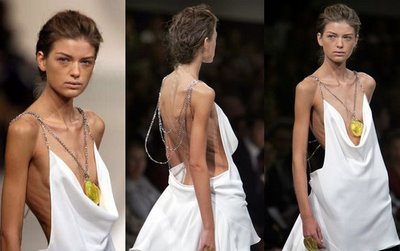以色列近日通过一项新法案,禁止使用体态过瘦的模特做广告,以此阻止饮食失调现象的蔓延。同时,如果出版物中使用的模特图片是经过技术加工使其显得更瘦的话,出版商需加以说明。政府出面通过立法干预时尚界,这在世界范围内尚属首次。新法案规定,模特接拍在以色列境内播放的广告之前都必须提供至少3个月内的体检报告,以核查其身体状况是否达到了世界卫生组织的健康标准。
据悉,这项法案是由以色列一位首席模特经纪人提议的。他表示,在他30年的职业生涯中看到太多年轻女子为了迎合时尚界的审美标准,让自己日渐消瘦,身体状况也每况愈下。不过,也有批评人士认为新法案关注的应该是模特的健康,而不仅仅是体重;并指出,有些模特天生就很瘦。

 |
|
A new Israeli law bans showing overly thin models from local advertising in an attempt to fight the spread of eating disorders. |
A new Israeli law bans showing overly thin models from local advertising in an attempt to fight the spread of eating disorders.
It also requires publications to disclose when they use altered images of models to make the women and men appear even thinner than they really are.
The law, passed late Monday, appears to be the first attempt by a government to use legislation to take on a fashion industry accused of abetting eating disorders by idealizing extreme thinness. It could become an example for other countries grappling with the spread of anorexia and bulimia, particularly among young women.
The law's supporters said they hoped it would encourage the use of healthy models in local advertising and heighten awareness of digital tricks that transform already thin women into illusory waifs.
"We want to break the illusion that the model we see is real," said Liad Gil-Har, assistant to law sponsor Dr. Rachel Adato, who compares the battle against eating disorders to the struggle against smoking.
In Israel, about 2 percent of all girls between 14 and 18 have severe eating disorders, a rate similar to other developed countries, said anthropologist Sigal Gooldin, who studies eating disorders.
The new law requires models to produce a medical report dating back no more than three months at every shoot that will be used on the Israeli market, stating that they are not malnourished by World Health Organization standards.
The U.N. agency uses a standard known as the body mass index — calculated by factors of weight and height — to determine malnutrition. WHO says a body mass index below 18.5 is indicative of malnutrition, said Adato, a gynecologist.
According to that standard, a woman 5 feet 8 inches (1.72 meters) tall should weigh no less than 119 pounds (54 kilograms).
Any advertisement published for the Israeli market must also have a clearly written notice disclosing if the model shown in it was digitally altered to make her, or him, look thinner. The law will not apply to foreign publications sold in Israel.
The law was championed by one of Israel's top model agents, Adi Barkan, who said in 30 years of work, he has seen young women become skinnier and sicker while struggling to fit the shrinking mold of what the industry considered attractive.
"They look like dead girls," Barkan said.
Critics said the legislation should have focused on health, not weight, saying many models were naturally very thin.
"The health of the model ... should be evaluated. Our weight can change hour to hour," said David Herzog, a professor of psychiatry and a leading U.S. expert on eating disorders.
Top Israeli model Adi Neumman said she wouldn't pass under the new rules, because her BMI was 18.3. Neumman said she ate well and exercised. She said legislation should have focused on health and well-being, not weight.
"Force actual tests. Make girls go to a doctor. Get a system to follow girls who are found to be puking," she said.
Legislator Adato said only 5 percent of women had BMI that naturally fell under 18.5.
"On the one hand, maybe we'll hurt a few models," Adato said. "On the other hand, we'll save a lot of children."
Pressure on the fashion industry has intensified in recent years, sparked by the deaths of models in Brazil and Uruguay from medical complications linked to eating disorders.
Uruguayan model Luisel Ramos, 22, collapsed and died soon after stepping off the runway in August 2006, reportedly of anorexia-linked heart failure.
Other governments have taken steps to prevent "size zero" medical problems but have shied away from legislation.
The Madrid fashion show bans women whose BMI is below 18. Milan's fashion week bans models with a BMI below 18.5.
The U.K. and U.S. have guidelines, but the fashion industry is self-regulated.
Unrealistic body images in the media are believed to shape eating habits, especially among young people, though there is debate about how influential they are.
Gooldin, the anthropologist, said young women used in television, movies and advertisements serve as references for the ideal body, rather than the women around them.
"There's a gap between our own bodies ... and ideal bodies. They keep shrinking and getting smaller," she said.
It's not clear whether the law will have a measurable impact, because Israeli teens take their cues from both international media and local publications, Gooldin said. And the ban isn't likely to affect many — there are only about 300 professional models in Israel, and only a few work abroad, said agent Barkan and model Neumman.
Gooldin said it was a positive step to deal with a problem that has plagued Western societies.
Legislator Adato said she hoped Israel would be an example other countries could study.
"You don't need to be underweight to be beautiful, or successful," she said.
相关阅读
(Agencies)

(中国日报网英语点津 Helen 编辑)